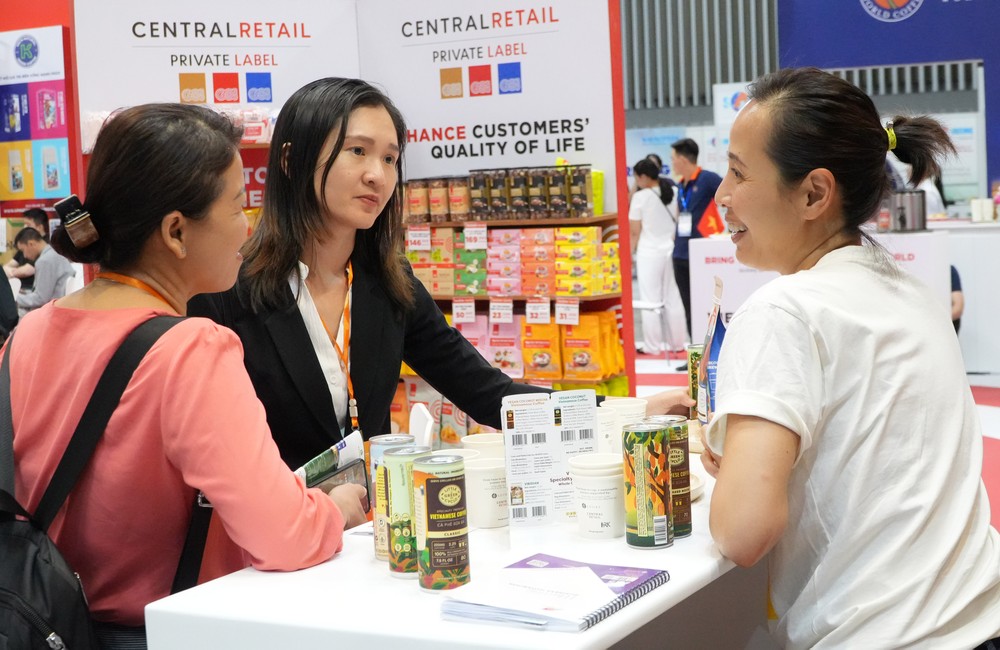
Vietnamese AFFP products are highly likely to rise to the top of the global market, not only in terms of quantity but also in value.
Small businesses participating in export market
According to Deputy Director Le Thanh Hoa of the Department of Quality, Processing and Market Development under the Ministry of Agriculture and Rural Development, Vietnam's export value of AFFP products reached $48.7 billion and $53 billion in 2022 and in 2023 respectively.
In the first five months of this year, the revenue of AFFP has increased to $25 billion - a new milestone with a two-digit growth rate of 15 percent compared to the same period last year.
In fact, many Vietnamese products have become the world's leading exporters in terms of production and export value. Vietnam has been the world's leading exporter of cashews and pepper. The Southeast Asian country is the second largest exporter of coffee and the third largest exporter of rice. In particular, Vietnam is among the top 10 exporting countries for processed seafood and food groups in different markets such as the US, Europe, Japan, Korea, China, and the ASEAN region.
Explaining the above issue, Director Doan Thi Hong Tham of Hygie and Panacee Company, said that not only large businesses with good financial resources but even small and very small businesses like her company also can export if they invest in the right direction. As soon as they enter the market, the company's products can be displayed on the Amazon e-commerce platform. The company's herbal products such as ginger tea, chamomile tea, and perilla leaf tea are quite unique and catch up quickly with consumer trends.
Similarly, Kokofi Company, a small company, has established the image of its coconut oil-refined cosmetics in a consumer's mind in the domestic and international markets. Ms. Lam Mong Thuy, the company's director, shared that if the company sells raw coconut oil, it will only cost a few tens of thousands of Vietnamese dong per liter, but if coconut oil is refined into branded skin, hair and body care products, the product value will increase hundreds of times and is favored by consumers both domestically and internationally.
Foreign consumers increasingly favor Vietnamese goods
Obviously, favorable soil conditions and the advantages of 16 bilateral and regional free trade agreements (FTAs) that Vietnam has signed have created momentum for agricultural and food exports to maintain a double-digit growth rate.
FTAs have created a great competitive advantage for strategic agricultural, forestry, and fishery products with strengths thanks to tariff reduction commitments, especially for processed products.
At the same time, they have attracted high-quality foreign investment into the agricultural sector, promoting deep and sustainable participation in the global supply chain. From another perspective, representatives of global distribution systems believe that Vietnamese goods, especially agricultural, forestry, fishery, and food products, are following the trend of global consumers.
First and foremost is the green trend, as manufacturing plants have quickly switched to using solar energy to replace fossil fuels. The use of environmentally friendly raw materials and the output of agricultural and food products are not only increasing rapidly in quantity but also increasingly meeting organic standards.
More importantly, investment in branding has been promoted, so Vietnamese products are becoming more clearly defined on the market. As a result, global consumers are increasingly favoring Vietnamese goods.
Deputy Chairman Paul Le of Central Retail Vietnam Group, said that in the past, the Thai market was almost devoid of Vietnamese fish sauce because Vietnam did not have a global standard fish sauce brand.
However, as soon as the group supported brand standardization and brought it into the supply chain for distribution to the Thai market, within just a week, thousands of bottles of Phu Quoc brand fish sauce were sold. Central Retail Group is currently supporting many Vietnamese enterprises to enhance their export capacity by building standard production processes in combination with brand investment.
Mr. Paul Le said that Vietnamese goods can increase indirect exports through the group's supply chain system and confidently compete with similar products from any country as long as investment is poured into quality and brand of products as per global standards.
Meanwhile, Deputy Minister Phan Thi Thang of Industry and Trade emphasized fast conversion of enterprises, the support of global supply corporations, the government, and the implementation of important policies and projects to promote the production of Vietnamese agricultural products by related ministries have helped exports of Vietnam’s farm produce and agricultural, forestry, and fishery products.
These supporting projects have brought about practical outcomes, contributing to the development and diversification of export and import markets, ensuring sustainable growth. Vietnamese enterprises are also encouraged to actively participate in the global goods production, supply and distribution chain based on their competitive advantages of Vietnamese goods.
The remaining issue is that enterprises need to proactively identify market tastes, constantly innovate themselves and connect with functional agencies and Vietnamese trade offices abroad. This will pave the way for enterprises to strengthen their export capacity and exist sustainably in the foreign market.
























